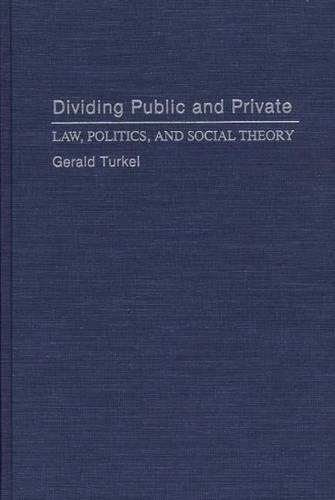
Dividing Public and Private: Law, Politics, and Social Theory
(Hardback)
Publishing Details
Dividing Public and Private: Law, Politics, and Social Theory
By (Author) Gerald Turkel
Bloomsbury Publishing PLC
Praeger Publishers Inc
30th October 1992
United States
Classifications
Tertiary Education
Non Fiction
Sociology and anthropology
Political science and theory
301.01
Physical Properties
Hardback
272
Width 156mm, Height 235mm
624g
Description
The distinction between private and public realms of experience, of social activity, and of personal identity are fundamental for shaping everyday understanding and organisation of social life, yet the distinction has not been paramount in sociological theorising. "Dividing Public and Private" makes the public/private division central to social theory and social inquiry. Author Gerald Turkel demonstrates that by placing the public/private distinction at the center of social thought and by rethinking the writings of such classical theorists as Marx, Durkheim, Weber, and Parsons through the prism of the public/private dichotomy, new dimensions are raised for the analysis of authority, legitimacy, law, political participation, and the very meanings of freedom and necessity. Based on the joining of legal, social, and political theory, Turkel argues that the public/private division is crucial for mediating and overcoming social totalism and privatised oppression. "Dividing Public and Private" challenges such theoretical approaches as critical theory, feminism, neo-Marxism, and liberalism to affirm the public/private division in directions that support equality, active participation in politics and the formation of collective projects, and individual self-determination. It aims to be suitable for theorists in law, political science and sociology.
Author Bio
GERALD TURKEL is Professor of Sociology at the University of Delaware. He has taught undergraduate and graduate courses in Social Theory and Sociology of Law for the past seventeen years, and has published widely.
